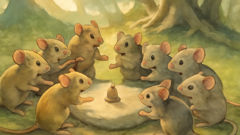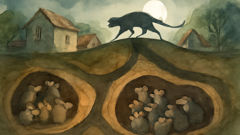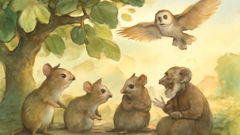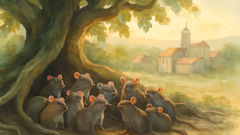Introduction
At the edge of an olive grove, where the golden light of a Greek sunrise crept softly over the tiled roofs and dusty lanes, there lived a community that thrived in the shadowy nooks and hidden burrows beneath an ancient village. This was not a community of villagers, merchants, or olive growers, but rather a bustling, secretive world of mice—timid yet ingenious, small but spirited. Their days were spent foraging for grains left behind in the market square, nibbling on crumbs beneath the baker’s window, and telling tales of adventure within the safe embrace of their labyrinthine tunnels. They had learned to live beside humans, snatching only what they needed, careful to leave little trace but the soft patter of their feet. Yet the mice’s harmony was always overshadowed by a singular, ever-present threat: the cat.
This was no ordinary feline. Sleek and silent as dusk, her green eyes glimmered with cunning as she prowled the alleys and sunny courtyards. To the villagers she was Agathe, the mouser, admired for her elegance and her skill at keeping the village free from vermin. But to the mice, she was a shadow in every doorway, the whisper of danger in every breeze. Mothers warned their pups about her, and seasoned foragers calculated every venture with her in mind. The cat’s presence was a weight on their freedom—a constant peril that made every scrap of food hard-won, every playful chase tinged with dread.
One morning, after a particularly close call near the miller’s storehouse, the oldest and wisest of the mice—Master Timoleon—called for a grand assembly beneath the roots of the ancient fig tree. The air buzzed with urgency as young and old gathered, whiskers twitching in anticipation. It was not the first time they’d met to discuss their nemesis, but the night’s events had left them shaken: a young mouse named Alethea had barely escaped Agathe’s claws. The time had come, Timoleon declared, for the mice to find a solution to their greatest fear—a way to outwit the cat once and for all.
So began a day of heated debate, wild proposals, and dreams of impossible bravery. Some whispered about magic, others about traps or tricks, but among them, a single idea began to shine—a plan that, if only it could be achieved, would mean freedom from fear forever. Yet as the idea took shape, so too did the realization of its true cost. What does courage mean when danger is certain? How do small voices change the world when peril stands in their path? The answer, as the mice would discover, lay not in bold ideas alone, but in the wisdom to understand what they could—and could not—do.
I. The Gathering Under the Fig Tree
The village still slumbered as the first rays of sunlight filtered through the leaves, dappling the earth with patterns that shifted as the breeze stirred the canopy above. The mice gathered in hushed anticipation, forming a semicircle around Master Timoleon, whose fur was silvered by age and whose eyes carried the memory of countless narrow escapes. He tapped his tail three times on a smooth pebble—a signal for silence. The chatter faded, replaced by the crackle of leaves and distant calls of waking birds.

Timoleon’s voice was measured but urgent. “My friends, our world grows smaller with each passing day. Agathe’s shadow lengthens. We cannot live in fear forever.” At his words, the assembly shivered. Mothers clutched their pups closer. The younger mice, like Lysander and Melina, exchanged worried glances. Yet there was something else in the air: the raw edge of hope. They were tired of hiding.
“Last night,” Timoleon continued, “Alethea was nearly lost to us. It was her quick thinking—and luck—that brought her home. But we cannot rely on luck. We must act.”
A murmur swept through the crowd. Some favored more vigilance, others whispered about moving deeper underground. But then, from the back, a small voice piped up. It belonged to Pheidon, a wiry mouse with keen eyes and a reputation for cleverness.
“Why don’t we find a way to hear Agathe coming?” he asked. “If we knew when she was near, we could scatter before she pounced.”
The idea sparked immediate interest. Mice edged forward, curiosity replacing fear. “How?” asked Melina, her nose twitching.
Pheidon hesitated, then continued, “If we could hang a bell around her neck, we’d hear her movements. No more surprises!”
Excitement rippled through the assembly. For the first time, the threat seemed manageable, the cat’s cunning within their grasp. Plans began to swirl: where to find a bell, how to fasten it, how to approach Agathe without being seen. Lysander leapt up. “It’s brilliant! We could use the little bell from the baker’s door. I’ve seen it—it’s not heavy, and it jingles with the lightest touch.”
Other mice chimed in, suggesting knots and ribbons, debating whether to work at night or dawn. For a moment, imagination soared over fear. Even Timoleon smiled, though his eyes remained thoughtful. “A wise plan is a treasure,” he said, “but its worth lies in the courage to see it through.”
The conversation turned to who would undertake the mission. Each mouse glanced around, hoping another would speak first. Pheidon shrank back, his earlier boldness fading. Melina looked at her paws. Lysander found himself studying the roots beneath him. Even the bravest mice were silent.
Timoleon did not scold. He waited, letting the silence grow until it became a question heavier than any bell. “Who among us will bell the cat?” he asked gently. No one answered. The wind shifted, carrying the scent of olive trees and the distant, haunting possibility of failure.
II. The Dream and the Doubt
As the morning wore on, the mice split into small groups beneath the spreading fig tree, each one dissecting the bold plan and measuring their own measure of bravery. The sun climbed higher, painting warm gold across their gathering, but a chill of uncertainty lingered. For every mouse who admired the brilliance of belling the cat, another whispered about the danger it posed. The conversation had shifted; imagination wrestled now with practicality.

In one cluster, Lysander tried to rally the young mice. “We can do this,” he insisted, his voice trembling with excitement and fear. “If we wait until Agathe naps in the shade, maybe two or three of us could creep up and fasten the bell.”
“Do you know how sharp her ears are?” countered Alethea, still shaken from her close escape. “She can hear a crumb drop across the courtyard. If she wakes…” Her words trailed off, but the others filled in the ending with their own grim imaginings.
Meanwhile, Pheidon and Melina searched the outskirts of the market square for a bell light enough for their plan. The baker’s doorbell, so inviting in theory, proved much too heavy when Melina managed to wrestle it loose and roll it across the cobbles. “Even if we could lift it,” Melina panted, “how would we ever tie it around her neck?” Pheidon frowned, his earlier confidence waning.
Back beneath the tree, Master Timoleon listened to the growing tide of doubts. He watched as hope frayed into worry, as each mouse measured the risk and found it too great. The elders quietly recalled stories of other brave souls—mice who had tried to outwit cats and never returned. The memory of loved ones lost hovered in the air, casting a shadow over even the most daring hearts.
As the day deepened, a strange silence fell over the mice. They watched the world beyond their meeting place: the sunlight glinting on the terracotta rooftops, the distant laughter of human children, Agathe herself stalking with languid grace through the dappled lanes. She was beauty and terror entwined—a creature both admired and feared.
Night approached. One by one, the mice made their way back to their nests, troubled by dreams of bells and claws. Pheidon lay awake, torn by guilt and longing. He wanted to be brave, to be remembered for something more than clever ideas. But as he imagined the reality of creeping towards Agathe’s slumbering form, every instinct screamed caution. Melina curled beside her sisters, listening for the faintest jingle in the darkness. There was none—only the soft pulse of her own heart.
Timoleon remained alone beneath the fig tree, his silhouette a shadow among shadows. He pondered the nature of wisdom: was it in finding clever solutions, or in knowing which dangers were too great to face? As he finally slipped into his own burrow, he whispered to the night, “May our hearts be guided by more than fear—but not blinded by hope alone.”
III. Lessons in Shadows and Light
Dawn brought a gentle hush, as if the world itself waited to see what the mice would do next. The village stirred with daily rhythms: roosters crowed, bread baked, the market bustled. For the mice, life returned to its cautious routine—scurrying from shadow to shadow, whispering warnings, and taking extra care at every corner.

Yet something had shifted among them. The boldness of their meeting lingered—not as a call to reckless action, but as a kind of unity in adversity. The plan to bell the cat became legend almost instantly, whispered from parent to child as both an emblem of hope and a warning. “It’s a clever idea,” mothers would say, “but not every clever idea should be tried.”
Pheidon grew quieter, content to watch and learn from those around him. He spent time with Timoleon, who shared stories of other dangers they had faced—floods, storms, traps set by humans. “Every problem has many answers,” Timoleon told him. “Wisdom is knowing which one will cost too much.”
The youngest mice found new purpose, forming lookout teams who signaled whenever Agathe prowled near. They discovered old escape routes and forged new ones, learning to work together instead of relying on luck. Melina taught her siblings to listen for the faintest sounds—a soft scrape, a sudden silence—and to trust their instincts.
As summer ripened, the mice became bolder in their foraging but never reckless. Agathe continued her rounds, sometimes catching a careless mouse but often finding herself outwitted by quick-thinking teams. She grew more curious about her elusive prey, pausing now and then to sniff at a tunnel entrance before resuming her patrols.
One afternoon, while exploring near the miller’s storehouse, Lysander stumbled across a thimble lost by a child. He rolled it home, inspiring the others with its novelty and sparking ideas for new hiding places and shelters. The mice began to see themselves not just as prey but as a community capable of invention and resilience.
The legend of the bell endured, not as a story of failure but as a testament to the value of thinking carefully. The mice learned that wisdom sometimes meant accepting the limits of their courage—and that survival depended on more than a single bold act. Their lives remained challenging, yet each day brought new ways to adapt, new songs sung in the tunnels, and new bonds of friendship forged in adversity.
Above them, the ancient fig tree stood witness to all: to their hopes, their fears, and their slow, steady triumph over the shadows that once seemed insurmountable.
Conclusion
And so, beneath the ancient fig tree and among the dusty stones of the Greek village, the mice learned that true wisdom comes not only from cleverness but from understanding one’s limits and facing fear with honesty. Their tale—of courage imagined but not taken, of unity forged in danger—echoed through the tunnels for generations. The bell remained a dream, its promise both hope and warning. Even as Agathe prowled the sunlit lanes above, the mice found strength in community, in vigilance, and in the knowledge that every risk must be weighed with care. The story of belling the cat did not end with a triumphant ringing but with something deeper: a legacy of caution and wisdom, quietly celebrated each dawn as they greeted another day of freedom and possibility.













